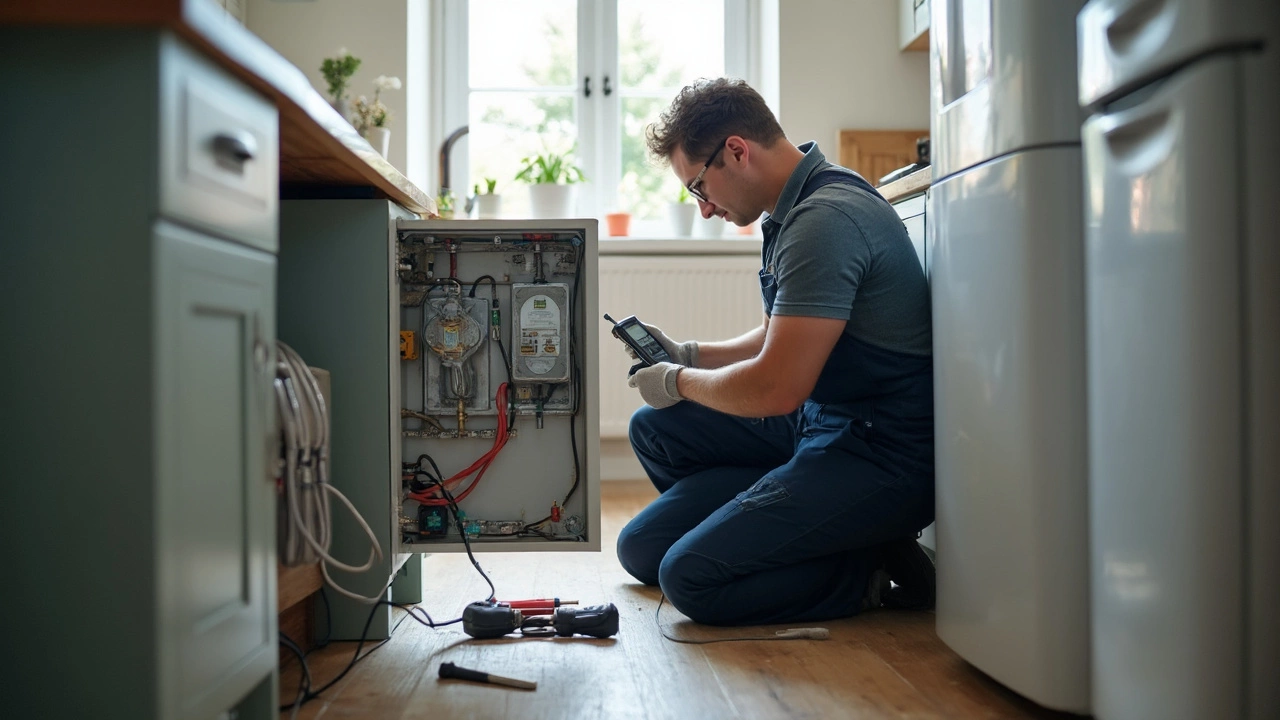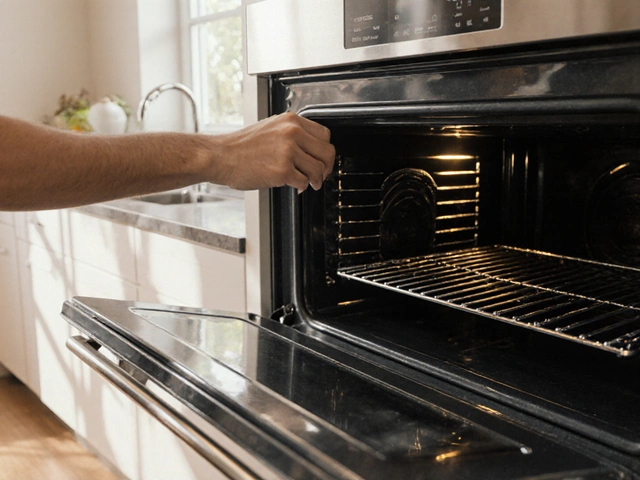Picture this: your home’s cold, the boiler’s on strike, and you’re stuck hunting for someone who actually knows what they’re doing. Not everyone in a tool belt can handle a broken boiler—these machines are way more complex than a straightforward appliance fix. Beyond gears and valves, there’s hot water, pressure, and even gas or electricity involved. Mess up one part and you’ve got more than just a chilly evening on your hands.
A real boiler technician isn’t just someone who watched a YouTube video. They need special training, especially in working safely with gas and pressurized systems. In most places, you shouldn’t let anyone near your boiler unless they’re certified—a gas leak or misstep could put your whole house at risk. Don’t take chances. The right tech will show up with the right paperwork and tools and know exactly how to track down what’s wrong, often just by listening to a weird new rattle or spotting a tiny leak.
- No, Not Just Anyone Can Fix a Boiler
- What Kind of Training Do They Need?
- Skills That Matter in Boiler Repair
- Why Legal Certifications Save You Trouble
- How to Pick the Right Boiler Tech
- Inside a Real Boiler Repair Call
No, Not Just Anyone Can Fix a Boiler
Let’s get one thing straight: fixing a boiler isn’t the same as unclogging a drain or screwing in a light bulb. Boilers deal with heat, pressure, and—if you’ve got a gas unit—flammable fuel. A small mistake can turn into a big problem, fast. That’s why laws in countries like the UK and the US require anyone repairing boilers that use gas to have specific certifications. If someone says they can work on your boiler without showing real proof, that’s a huge red flag.
The rules exist for a reason. According to the U.S. Consumer Product Safety Commission, carbon monoxide from faulty home heating kills an average of 170 people in the U.S. each year. Bad repairs can also lead to massive leaks and even explosions. It’s serious stuff that you don’t want left to chance.
| Common Boiler Risks | Potential Consequence |
|---|---|
| Improper gas line connection | Gas leak, fire risk |
| Poor pressure management | System explosion, water damage |
| Bad venting | Carbon monoxide build-up |
So who actually works on boilers? It’s almost always a boiler repair engineer (sometimes called a heating engineer or boiler technician). These folks aren’t just handy—they’ve usually spent years learning their stuff. For gas systems in Britain, for example, only Gas Safe registered engineers are legally allowed to fix your boiler. You can check a tech’s status online in less than a minute; don’t be afraid to double-check if you’re unsure.
Electric boilers aren’t a free-for-all either. Qualified electricians or HVAC specialists with boiler training should be your go-to. So next time the heat goes cold, resist the urge to call “a guy who knows a bit about plumbing.” This job calls for a pro who knows exactly what’s at stake.
What Kind of Training Do They Need?
Ever wonder how someone turns into a legit boiler repair specialist? It’s not just a few days in a classroom. The people fixing boilers go through pretty hands-on training, and rules are pretty strict for a good reason. In the UK, for example, you legally need to be Gas Safe registered before you can even touch a gas boiler. In the US, people usually need EPA certification for working around refrigerants and HVAC systems. That piece of paper isn’t just for show—it’s proof they’ve passed real-world tests and know what they’re doing.
Here’s a quick look at what the typical career path looks like for a boiler repair pro:
- Complete high school or get a GED. (No skipping the basics.)
- Get into a technical or trade school covering heating systems, plumbing, and electrical basics.
- Land an apprenticeship—two to five years of working alongside the pros.
- Pass written and practical tests—these weed out the people who only look the part.
- Keep up with ongoing training and safety certifications, especially since standards and tech keep changing.
Some boiler techs also go for extra specialties, like commercial boilers or renewables. It can mean extra classes and more tough exams.
| Country | Mandatory Certification | Training Duration |
|---|---|---|
| UK | Gas Safe Register | 2-4 years |
| USA | EPA 608, HVAC License | 2-5 years (apprenticeship) |
| Australia | Plumbing/Mechanical Services License | 3-5 years |
Most folks don’t realize how often boiler techs have to go back for refresher courses or new certifications when the rules change. They’re not just showing up with a wrench and good intentions—they’ve put in years to make sure your heating system is safe and actually works.
Skills That Matter in Boiler Repair
Fixing a boiler isn’t just about having strong arms or liking to tinker with stuff. It takes a real mix of know-how—both hands-on skills and sharp thinking. First off, technical knowledge is a must. A good repair tech understands heating systems, gas controls, electrical wiring, and how water flows through a pressurized circuit. They should be able to read wiring diagrams and spot the difference between a bad sensor and a leaking valve. One survey by the UK’s Gas Safe Register found over 70% of serious boiler defects were caught thanks to skilled diagnosis, not luck.
Communication sounds boring, but trust me, it matters. Imagine someone fixing something in your home: You want them to explain what’s wrong, what they’re doing, and why it needs parts or repairs—not just grunting and shrugging. A solid tech will break things down in plain English, so you’re not left guessing.
Problem-solving is another biggie. Boilers throw up all sorts of weird issues: sudden loss of pressure, power cut-outs, flashing error codes. A great boiler repair pro works like a detective. They piece together what happened, find the root cause fast, and don’t just slap on a bandage. Fast thinking saves you time and money down the road.
Safety is always front and center. Techs are trained to spot carbon monoxide risks, know when a part is a fire hazard, and double-check gas lines for leaks. These aren’t optional—every year in the UK, unsafe gas work causes dozens of injuries and can be fatal. Want numbers?
| Critical Boiler Repair Skills | Why They Matter |
|---|---|
| Gas & Electrical Safety | Avoids dangerous leaks or shocks |
| Diagnostic Ability | Finds and fixes problems faster |
| Clear Communication | Builds trust, avoids confusion |
| Manual Dexterity | Tackles tight spaces and delicate parts |
| Attention to Detail | Prevents repeat breakdowns |
Finally, patience makes a difference. Boilers aren’t always cooperative, and repairs can mean crawling under cupboards or working in cold, cramped places. The right repair guy won’t just rush and leave things half-done; he’ll stick with it until your system is humming again.

Why Legal Certifications Save You Trouble
If you’re looking to get your boiler fixed, a legal certification isn’t just a nice bonus—it’s the main thing that separates someone who knows what they’re doing from someone who could wreck your whole system or worse. In the UK, anyone touching a gas-fired boiler must be Gas Safe registered. Over in the US, it’s all about having state HVAC licenses or apprentice/journeyman cards. No certificate? No job—at least, not if you care about safety.
Working on a boiler means handling gas lines, electric controls, and high-pressure water. The risks? They’re real: gas leaks, carbon monoxide, water damage, or even explosions. Certifications prove the engineer’s trained and knows the specific make and model in front of them. Insurers or landlords actually require this proof before any repairs. Without it, you could be left with voided warranties, denied insurance claims, or fines. Not worth saving a few bucks.
- Ask your engineer for their Gas Safe ID in the UK or their license number in the US before they even touch your boiler.
- Double-check ID online through Gas Safe Register or your state licensing board—takes two minutes, could save you thousands.
- Look for badges from well-known bodies: Gas Safe, NICEIC (for electrics in the UK), or EPA for handling refrigerants in the US.
The stats are eye-opening. Take a look:
| Region | Legal Requirement | Consequences of No Certificate |
|---|---|---|
| UK | Gas Safe Registration | £6,000 fine, prosecution, void insurance |
| US (varies by state) | HVAC License | $1,000+ fines, insurance denial |
Bottom line: a certified boiler repair pro protects your home and wallet. Don’t take someone’s word for it. Always check their credentials before you let anyone near your heating system.
How to Pick the Right Boiler Tech
Shopping for someone to fix your boiler isn’t like buying a phone charger—you want expertise, the right attitude, and zero guesswork. Here’s what actually matters when you’re picking a boiler repair specialist.
- Certifications are everything: In the UK, look for Gas Safe registration; in the US, check for an HVAC license. No proper certification? Move on fast.
- Experience counts: Techs with five or more years in the field usually spot problems quicker and fix things right the first time.
- Insurance: If the guy’s not insured, any accidents or further damage might be on your dime. Ask to see proof.
- References and reviews: Jump online or ask neighbors. Real feedback tells you heaps more than an ad ever will.
- Specializes in your boiler type: There’s a staggering variety of boilers—combination, system, conventional… A good tech should know your model inside and out.
According to a 2024 UK home maintenance survey, 61% of boiler breakdowns were fixed by a certified tech within 24 hours, while repairs by uncertified folks took on average three times longer and led to recurring issues in 27% of cases.
| What to Check | Why It Matters |
|---|---|
| Gas Safe/HVAC License | Guarantees legal and safe work |
| Insurance | Protects you from liability |
| References/Reputation | Avoids hiring cowboy contractors |
| Specialization | Expertise with your specific boiler |
| Written Quote | Stops surprise costs |
One last tip: a good boiler tech doesn’t get cagey when you ask questions. A real pro will explain what’s wrong, share a cost breakdown, and spell out next steps. If someone seems shifty or can’t answer basic questions, keep looking—you want someone who actually cares about keeping your home safe and warm.
Inside a Real Boiler Repair Call
So, what actually happens when a boiler repair expert turns up at your door? Forget the TV drama—real repair work is a mix of know-how, patience, and safety checks. The first thing the technician usually does is ask what you’ve noticed: weird noises, leaks, cold radiators, error codes on the display. These clues help them home in on the problem without wasting time.
Next, they get straight into safety mode. Gas valves are checked, the power’s switched off, and carbon monoxide risks are assessed—no one touches anything until those basics are clear. Accredited techs always carry a personal gas sniffer and know exactly where to place it for any early warning signs.
Inspection is hands-on. The cover comes off, and they’ll look at:
- Pressure levels on the gauge—should sit between 1 and 2 bar cold, higher could mean serious trouble.
- Pilot light or ignition—newer boilers often have LED indicators but older ones need a manual check.
- Water leaks—stains, corrosion, or pooling can help spot a blown seal quick.
- Ventilation and flue—exhaust has to flow outside, so blockages spell danger.
They don’t just guess either. Here’s a common troubleshooting routine, step-by-step:
- Read boiler error code (if available)
- Test electrical connections—most boiler breakdowns involve worn wires or loose terminals
- Check the expansion vessel and pressure relief valve—these are common culprits for leaks
- Flush out sludge or trapped air from the system
- Replace any defective parts—like zone valves or thermostats, with manufacturer-approved pieces
If a replacement part is needed, good techs will show you exactly which one and explain why, rather than just tossing jargon your way. An honest boiler tech usually keeps some of the most common spares—ignition electrodes, fans, pressure switches—in their van, so repairs often happen on the same visit.
Some boiler repairs can take only 30 minutes, while tricky issues might stretch to a couple of hours. Below is a typical breakdown of times for common faults:
| Fault Type | Average Repair Time |
|---|---|
| Low Pressure | 25 minutes |
| Ignition Problem | 45 minutes |
| Pump Replacement | 1.5 hours |
| Leaky Valve | 40 minutes |
| Full Service & Repair | 2 hours |
At the end, engineers test the system—hot water, radiators, pressure, gas safety—and walk you through what they’ve done. Ask for a breakdown of the work done and the prices. Good repair specialists also give you tips to watch for in the next few months, like strange hissing or a slow drop in pressure, so you can spot future trouble sooner rather than later.





